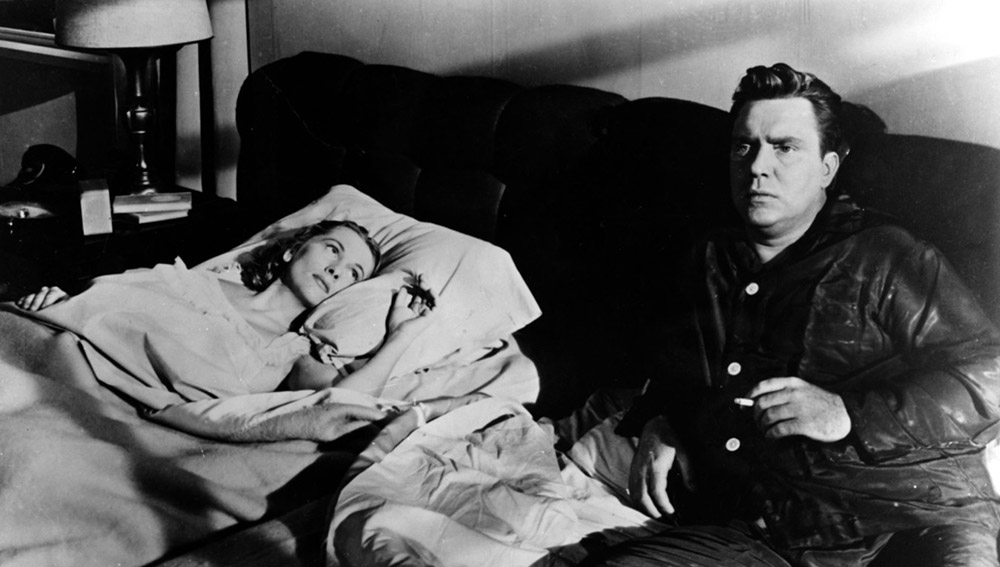We talk a lot about female directors on Citizen Dame – as we should, because female directors are amazing. And first among the greats is Ida Lupino, nicknamed “Mother of Us All” on her sets. Lupino was best known for her noir performances as an actress, but she was often on suspension at Warner Brothers for being “difficult” (that’s man-speak for “she was snippy to me once”). Suspension, however, led to an interest in directing. In the 1950s she became one of the best independent directors of the classical period, and only the second woman to join the DGA. She formed her own production company with her husband and wrote and directed a group of “social problem” films—dealing with rape, abortion, and bigamy—that are influential to this day. Her most famous is the tense noir The Hitch-Hiker, but The Bigamist, from 1953, is also groundbreaking film noir, shot on a limited budget, and one of the few films that Lupino directed with herself in one of the roles.

The film opens with Harry Graham (Edmond O’Brien) and his wife Eve (Joan Fontaine) discussing adoption with Mr. Jordan (Edmund Gwenn), following their discovery that Eve is infertile. When Jordan says that he’ll have to do some investigation into the couple before they’re approved for adoption, Harry becomes nervous and hostile, prompting Jordan to look deeper into his life. Harry travels for his work, away from home for weeks at a time, and as Jordan investigates, he discovers that the apparently perfect husband is leading a double life – he has another wife, and a baby, in Los Angeles. But before Jordan can call the police, Harry begs to be allowed to explain how things have come to such a pass.
The Bigamist takes a potentially sordid subject and treats it with a surprising degree of complexity and understanding. Harry isn’t a villain, per se, but the film doesn’t excuse his choices and his behavior. Instead, it presents what happens as no one’s immediate fault, but rather an intimate tangle of love, and social and gender roles. Rather than hewing to a strict moral universe, The Bigamist takes pains to paint all three main characters as complicated, dynamic individuals, all of them desperate to love and be loved.
While The Bigamist doesn’t contain the same intensity of noir imagery that we see in The Hitch-Hiker or Outrage, Lupino makes copious use of the streets of San Francisco and L.A. as emblematic of Harry’s dual lives. L.A. has a freedom to it in which he is able, as far as he is concerned, to start again, to build a domestic life that he desires with a woman more domesticated than his wealthy, accomplished wife. San Francisco, by contrast, is a series of sloping streets and close cul-de-sacs, beautiful but confining, in which Harry and Eve reside in comfort but without bliss. Neither world nor relationhship is perfect, and it is Harry’s pursuit of social, gendered, and sexual perfection that ultimately condemns him. Unable to be happy in the imperfect, he involves himself and two innocent women in a criminal, tragic situation. Lupino dissects all of this with a laborious attention to detail, drawing out the humanity of each of her characters without either excusing or condemning them.
Lupino’s dual role as director and actress – she plays Harry’s other wife – further complicates this narrative, and one would imagine that if she were a male director occupying these roles, there would have been much talk of the auteur. Her character offers Harry what his marriage to Eve seems to lack – the comfort of the domestic sphere in which the woman waits for the man to return home, to cook and clean for him, to offer him security and children. Lupino was often typed as a dangerous woman in her noir roles, yet she is the one to provide that domesticity, and also the one who unwittingly contributes to Harry’s crime.
The Bigamist is a fascinating film in itself, and a stirring entry for a female director. Above all else, it cements Ida Lupino as a great filmmaker who tackled subjects that most studios and male directors would shy away from. Her artistry lies in taking a limited budget and a subject that would easily contribute to a lurid, unnuanced narrative, and crafting a deeply human, deeply moving film from out of it. While enmeshed in its time, The Bigamist occasionally transcends itself, revealing a depth of human experience that many films of the same period did not, or could not, grapple with.
The Bigamist is available on Amazon Prime.

Episode 58: Damesgiving – Citizen Dame
[…] Lauren’s new series DameStruck looks at Ida Lupino’s The Bigamist (1953) […]